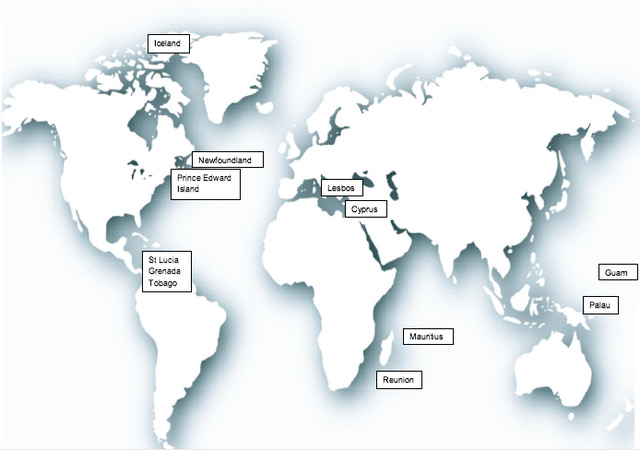Comparing Small Island States and Subnational Island Jurisdictions:
Towards Sustainable Island Futures
A research project funded by the Social Sciences and Humanities Research Council (SSHRC)
Principal Investigator: Dr. Laurie Brinklow, Chair, Institute of Island Studies
ABOUT | SUMMARY | RESEARCH TEAM | BACKGROUND | NEWS AND UPDATES

ABOUT THE PROJECT
Island jurisdictions are often viewed as vulnerable, poverty-stricken, and destitute, but research shows many of these islands are better described as innovative and entrepreneurial. This three-year project, funded by the Social Sciences and Humanities Research Council of Canada (SSRHCC), brings together six representatives of small island states (Iceland, New Zealand, Mauritius, Palau, Cyprus, St. Lucia, and Grenada) and six representatives from non-sovereign, subnational island jurisdictions (Prince Edward Island, Newfoundland, La Réunion, Lesbos, Guam, and Tobago). These groups will compare experiences, to see whether statehood is a boon or hindrance when implementing sustainable practices in social-political, cultural-artistic, economic, and environmental areas.
The project will develop a set of measures of sustainability and sovereignty by undertaking household and focus group surveys using comparisons of six pairs of islands. The Institute of Island Studies and the UNESCO Chair in Island Studies and Sustainability will coordinate these activities, bringing together island researchers and solving issues using a local-to-global integrated approach.
PROJECT SUMMARY
Recent evidence suggests that Small Island States (SIS) as well as non-sovereign Subnational Island Jurisdictions (SNIJs) are developing much more sustainable capacities. Although the public narrative is often one that sees these jurisdictions as vulnerable, poverty-stricken and destitute, many island jurisdictions might now be more accurately described as innovative and entrepreneurial. At the forefront of developing sustainable capacities may be political status. Does being one of the world’s 42 independent island states (SIS) versus being one of the 100+ ambiguous political island territories or dependencies (SNIJ) of a larger state affect the sustainability of island jurisdictions and the resilience of islanders?
The goal of this project is to bring together the knowledge and expertise of multiple researchers and partners from 12 islands to develop a better understanding of the sustainable development practices and potential of small islands, and especially the role that sovereignty and international relationships play in achieving a more sustainable future. It will do so by critically examining the similarities and differences between Small Island States and Subnational Island Jurisdictions, including their relative capacities for implementing sustainable practices in socio-political, cultural-artistic, economic and environmental domains. It will then compare and contrast the island-to-metropole/mainland (SNIJs) or international (SIS) relationships for these groups of small islands. In addressing these objectives, a parallel goal that extends beyond the life of this project is to contribute to changing the rhetoric surrounding the sustainability of small islands from one of vulnerability to one of resilience.
The comparative approach represented by this application builds upon those relationships and networks of island studies scholars and practitioners across all regions of the world. The project employs a mixed methods approach, developing a set of measures of sustainability and sovereignty and undertaking stakeholder and focus group surveys using comparisons of six pairs of islands (i.e., 6 Island States and 6 Subnational Island Jurisdictions). Coordinating these activities are the Institute of Island Studies at the University of Prince Edward Island and the UNESCO Chair in Island Studies and Sustainability, entities that have experience in bringing together island researchers and solving island issues using a local-to-global integrated approach. It is supported by a network of small island universities (i.e., the Reseau d’Excellence des Territoires Insulaires) and researchers (i.e., the International Small Islands Studies Association). Collaboratively, these groups and the partners involved in this project from Iceland, Greece, Malta, Reunion, Australia, Guam, Mauritius, Newfoundland, Prince Edward Island, Trinidad & Tobago, St. Lucia, and Grenada have mobilized around this research question and have the experience, skills and close relationships within their respective communities to answer the research questions.
This project is proudly supported by the Social Sciences and Humanities Research Council (SSHRC). SSHRC is the federal research funding agency that promotes and supports postsecondary-based research and research training in the humanities and social sciences. By focusing on developing talent, generating insights and forging connections across campuses and communities, SSHRC strategically supports world-leading initiatives that reflect a commitment to ensuring a better future for Canada and the world.

